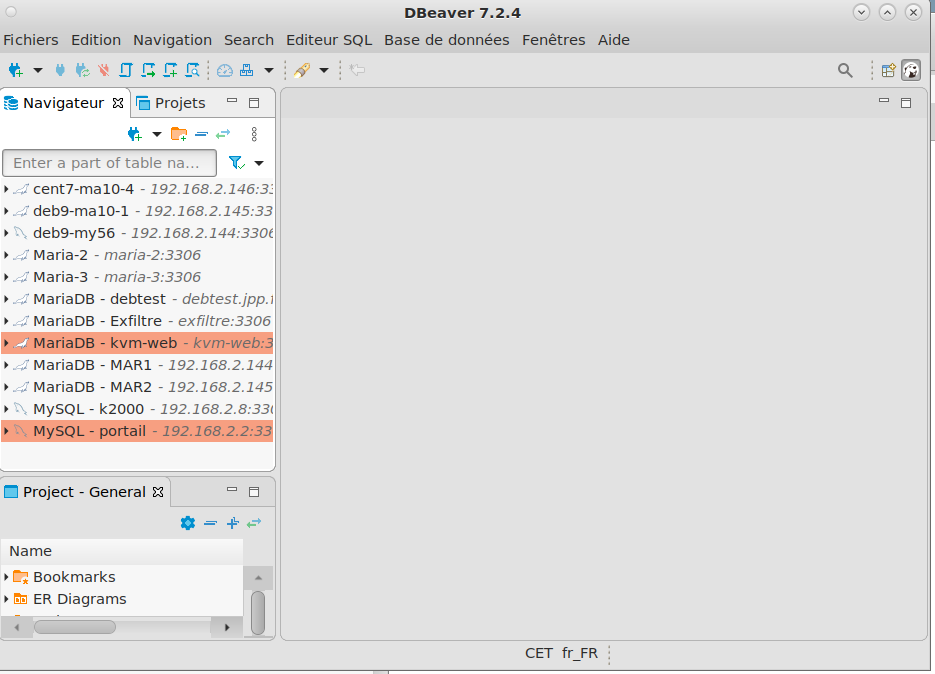Dbeaver Influxdb

This page documents an earlier version of InfluxDB.InfluxDB v2.0 is the latest stable version.
Use the InfluxDB inch tool to simulate streaming data to InfluxDB and measure your performance (for example, the impact of cardinality on write throughput). To do this, complete the following tasks:
Install InfluxDB inch
To install
inch, run the following command in your terminal:Verify
inchis successfully installed in yourGOPATH/bin(default on Unix$HOME/go/bin).
Use InfluxDB inch
Log into the InfluxDB instance you want to test (for InfluxDB Enterprise, log into the data node(s) to test).
Run
inch, specifyingoptions(metrics) to test (see Options table below). For example, your syntax may look like this:This example starts generating a workload with:
- 8 concurrent (
-c) write streams - 10000 points per batch (
-b) - tag cardinality (
-t) of 10000 unique series (2x5000x1) - 10000 points (
-p) per series - any write
-consistency
Note: By default,
inchwrites generated test results to a database namedstress. To change the name of the inch database, include the-db stringoption, for example,inch -db test.- 8 concurrent (
To view the last 50
inchresults, run the following query against the inch database:
Options
InfluxDB; Apache Cassandra; Redis; Apache Hive; All these databases have SQL interface and you can work with them as with good old relational databases. And this is not some kind of JDBC driver abstraction – DBeaver EE supports all native data types and databases structure explorer for. DBeaver user guide 2/229. Database Management Enterprise Databases support Customizing DBeaver Troubleshooting Admin Guide Database Connections Create Connection. InfluxDB Redis AWS DynamoDB Google Bigtable Couchbase CouchDB Apache Hive/Spark/Impala Netezza SQLite Crypt Informix Installing extensions - Themes, version control, etc. DBeaver Enterprise Edition. Includes all features of DBeaver Community plus: - NoSQL/BigData databases: MongoDB DynamoDB DocumentDB Keyspaces Bigtable Cassandra Couchbase CouchDB Redis InfluxDB - Enterprise extensions for. EE version web site: dbeaver.com Trial version is available. Windows 64 bit (installer) Windows 64 bit (zip) Install from Microsoft Store; Chocolatey (choco install dbeaver) Mac OS X. Mac OS X (dmg) Mac OS X (zip) Brew Cask (brew install -cask dbeaver-community) MacPorts (sudo port install dbeaver-community) Linux.
inch options listed in alphabetical order.

| Option | Description | Example |
|---|---|---|
-b int | batch size (default 5000; recommend between 5000-10000 points) | -b 10000 |
-c int | number of streams writing concurrently (default 1) | -c 8 |
-consistency string | write consistency (default “any”); values supported by the Influxdb API include “all”, “quorum”, or “one”. | -consistency any |
-db string | name of the database to write to (default “stress”) | -db stress |
-delay duration | delay between writes (in seconds s, minutes m, or hours h) | -delay 1s |
-dry | dry run (maximum write performance perf possible on the specified database) | -dry |
-f int | total unique field key-value pairs per point (default 1) | -f 1 |
-host string | host (default http | -host http://localhost:8086 |
-m int | the number of measurements (default 1) | -m 1 |
-max-errors int | the number of InfluxDB errors that can occur before terminating the inch command | -max-errors 5 |
-p int | points per series (default 100) | -p 100 |
-report-host string | host to send metrics to | report-host http://localhost:8086 |
-report-tags string | comma-separated k=v (key-value?) tags to report alongside metrics | -report-tags cpu=cpu1 |
-shard-duration string | shard duration (default 7d) | -shard-duration 7d |
-t [string]** | comma-separated integers that represent tags. | -t [100,20,4] |
-target-latency duration | if specified, attempt to adapt write delay to meet target. | |
-time duration | time span to spread writes over. | -time 1h |
-v | verbose; prints out details as you’re running the test. | -v |

Dbeaver Influxdb
** -t [string] each integer represents a tag key and the number of tag values to generate for the key (default [10,10,10]). Multiply each integer to calculate the tag cardinality. For example, -t [100,20,4] has a tag cardinality of 8000 unique series.
Support and feedback
Dbeaver Ce Influxdb
Thank you for being part of our community!We welcome and encourage your feedback and bug reports for InfluxDB and this documentation.To find support, the following resources are available:
Dbeaver Community Edition Influxdb
InfluxDB Cloud and InfluxDB Enterprise customers can contact InfluxData Support.
